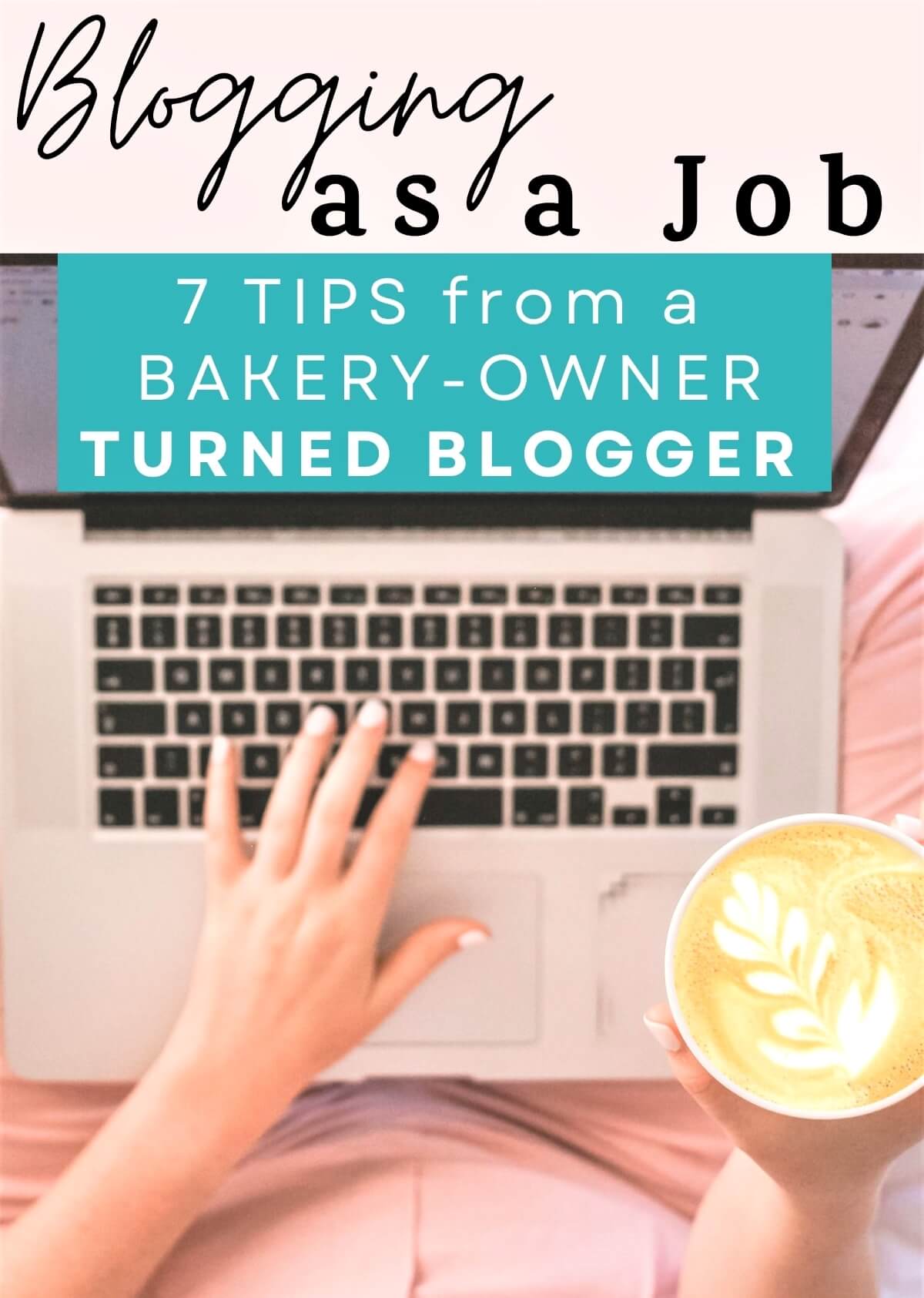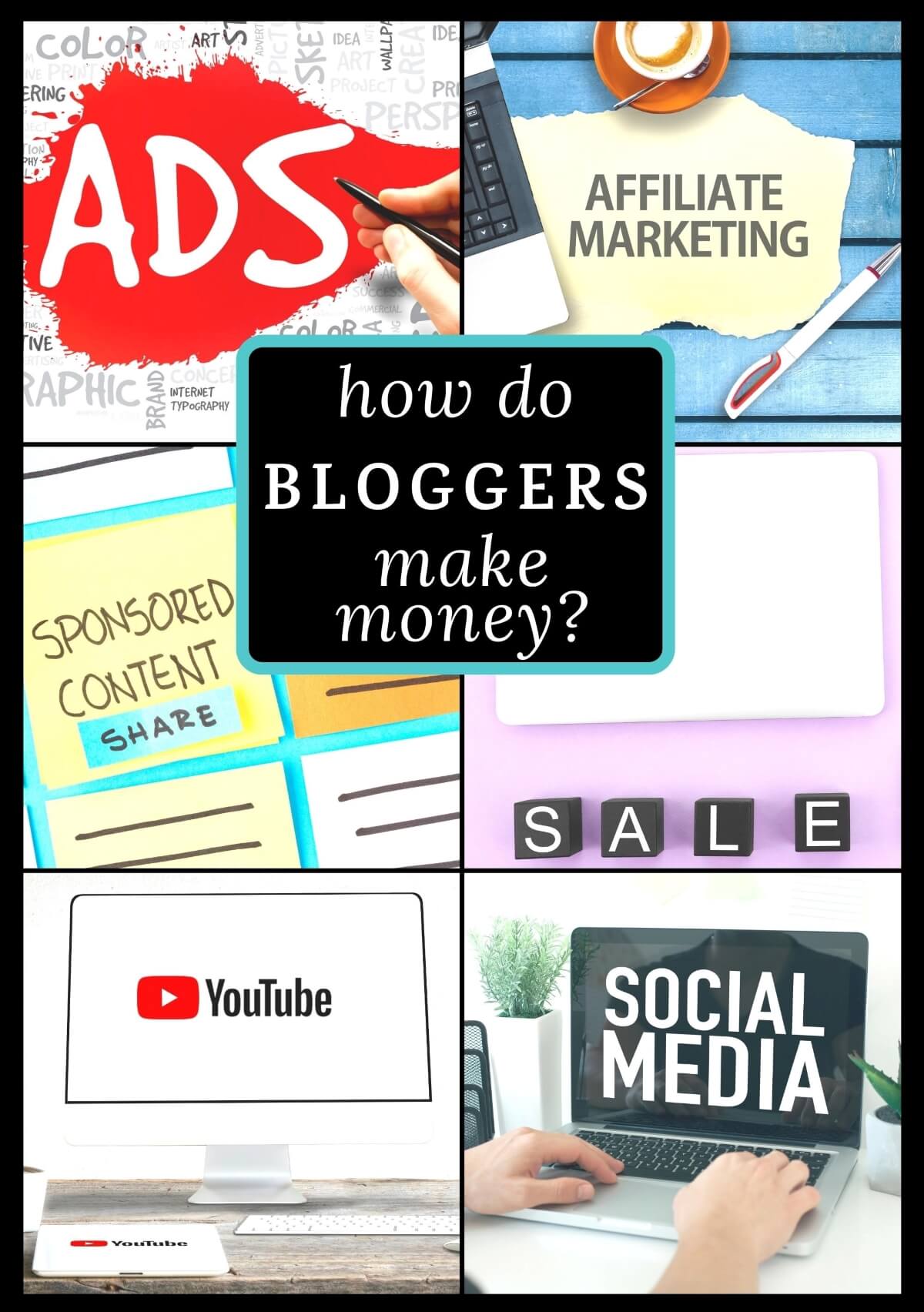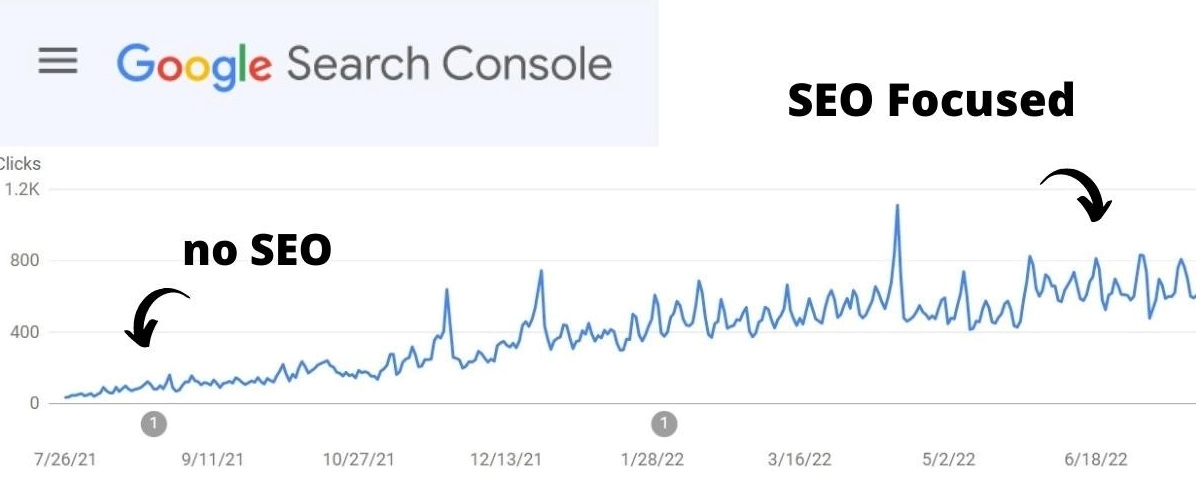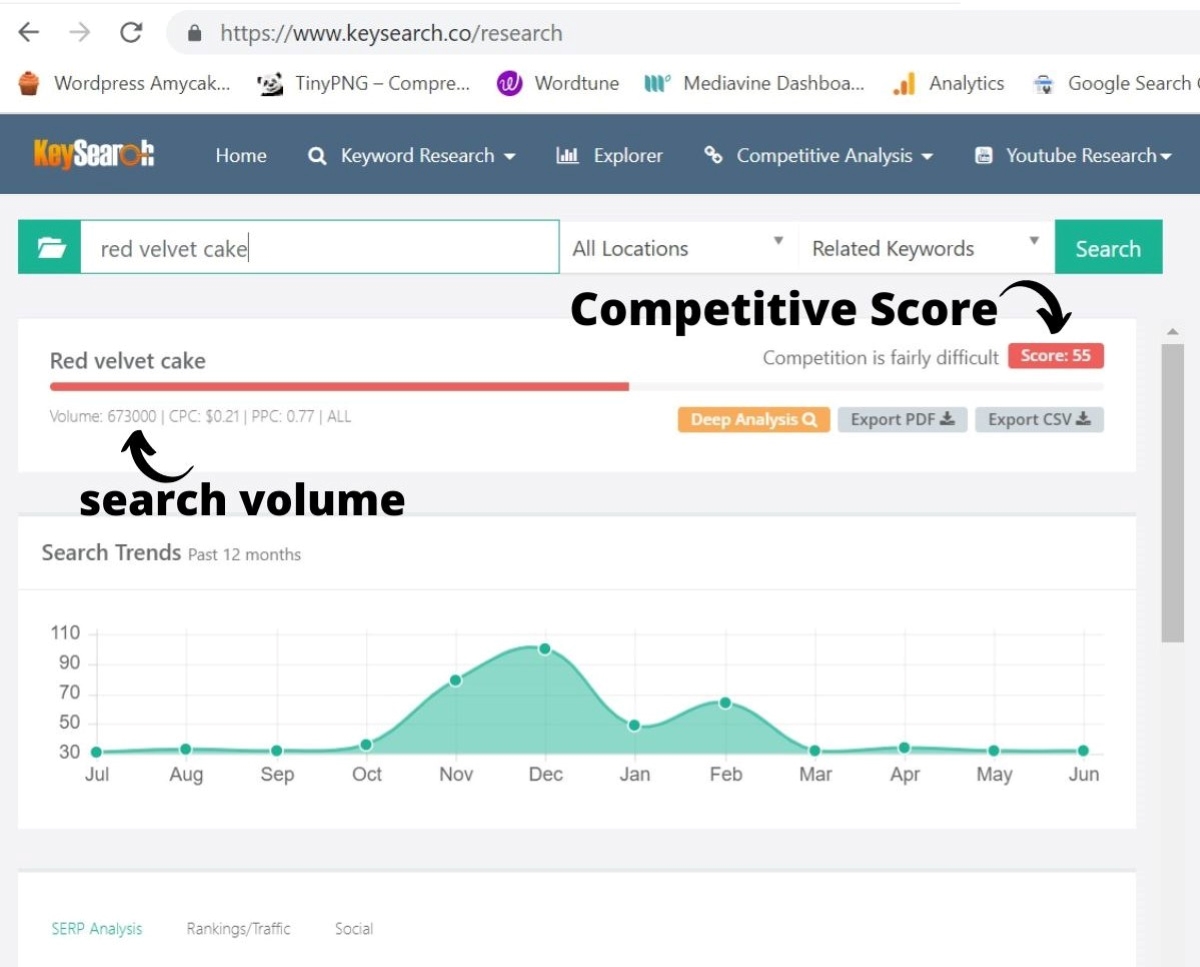Blogging as a job can mean a more flexible work schedule, a continuous passive income, and getting to write about things you care about. If you're thinking about turning a blog into a career or side hustle, it will take quite a bit of time and effort. I’d like to help by sharing a few things I wish someone had told me when I was just beginning.

People often ask me how I make money from my websites. I started my first blog in early 2021 after owning a bakery for 11.5 years. At the time, I knew nothing about how to start a blog. I jumped in by reading everything I could get my hands on about blogging.
It began as a hobby with dreams of a side income, but within one year the blog grew into the best thing I could have done for my family.
This post contains tips that I would recommend to a friend thinking about starting a blog. In fact, I started my additional blogs using all of these recommendations!
The following 7 tips are described in detail for beginner bloggers. Feel free to jump ahead using the links below. More advanced bloggers should check our my favorite blogging tools.
Jump to:
🕰️ 1. Be patient
Before you jump into blogging as a career or side hustle, understand that there are faster ways to earn money. My high expectations nearly led me to give up on this blog a couple of times--I'm so happy that I didn't!
The longer you blog and the more content that you build, the more likely your blog is going to gain traffic—and more traffic means more opportunities to make income.
Every one of those high-quality blog posts that you wrote 1,2, or 3 years ago has the possibility to provide income for years to come.
How fast can you make money blogging?
Most bloggers can start receiving some income between three months to a year from when they started. But this also depends on the time and effort they put in and the methods they use to monetize their content. A lot of bloggers give up before they reach that point.
It took me nearly a year (and around 60 blog posts) to generate consistent and steady part-time income, juggling two kiddos and working on my blog about 25-30 hours a week. This gradually and steadily increased as I publish more blog posts. Eventually, I started three more blogs in different niches.
My biggest suggestion to people contemplating starting a blogging career is to start it now as a hobby or side hustle, with the goal of making money from your blog long term. Had I known my bakery was going to close, I would have started this blog as a side-project 10 years ago!
👍🏻👎🏻 2. Consider the Pros and Cons
Before you jump in, there are several things you should consider: can you devote the time to blogging? How much money do you want to make from blogging? Do you enjoy writing enough to do it on a daily basis?
Answering these questions honestly will help you to clarify your goals and set realistic expectations. Here are some pros and cons of blogging as a job to consider.
Pros
- No expertise or degree is required--anyone with passion and drive can learn to launch their own blog doing what they love.
- You can work anytime and from anywhere.
- You can write about things you’re knowledgeable and passionate about.
- It helps you meet more people who are interested in your topics.
- Your blogging, writing, and (if applicable) photography skills will improve.
- Once you publish your content, you can continue to earn from it every year.
- Blogging consistently can provide financial growth.
Cons
- Blogging as a career or side hustle takes a LOT of time and effort.
- Consistent publishing is typically required for continued growth.
- Your blog will need regular updates.
- Unexpected technical issues can crop up and resolving them can be time-consuming.
- You may find yourself thinking about work non-stop instead of clocking out at the end of the day.
- Working on your blog by yourself can be isolating, especially when blogging is not a well-known topic (i.e. you won't be able to discuss "Search Engine Optimization." with many people. I talk more about SEO later ☺️ ).
- A lot of people may not understand or realize that blogging is a real job.
💰 3. Diversify your income streams
One of the biggest and most common questions would-be bloggers have is how bloggers make money.
When you’re starting out, it’s a good idea to plan how you want to monetize your content and which method makes the most sense for you. Even if one source of blogging revenue is not enough, combining several revenue streams can provide consistent income.
How do bloggers make money?

Most bloggers make money through ads, affiliate links, sponsored posts, or selling digital products. They can also make money through social media posts, youtube, and podcasts.
As a professional blogger, 65% of my income comes from ads on my site, 25% is from social media, and the remaining 10% is through affiliate marketing links. Here’s a quick rundown of some of these income streams:
Ads
A blogger can sign up with an ad management company to place advertisements on their blog. The ad companies will typically display the highest bidding ads and pay the blogger a percentage.
I know online ads are annoying, but I’m much more understanding about ads now that I know how much time and money (and heart and soul) bloggers put into their blogs.
There are a variety of ad companies to choose from, but the higher-paying ad companies (like Mediavine and Adthrive) are only available once you reach 50,000 blogging sessions or 100,000 pageviews a month.
I was thrilled to reach my goal of 50,000 sessions a month just shy of my one-year blog anniversary, allowing me to join Mediavine.
It's likely not worth the hassle to work with lower-paying ad companies (think a few cents to a few dollars a day). They can slow down your site and you may be required to manually place every ad.
For my second blog, I'm not even worrying about ads until I get enough traffic to be accepted into Mediavine.
Affiliate Links
Within your blog, you can recommend products or services and include their links. Each time someone makes a purchase using your affiliate link, you earn a small commission from your successful recommendation.
You can get these links through affiliate companies like Amazon Affiliates or Shareasale, which offer several merchants and products to choose from. The commission percentage is usually small, but it varies depending on the item category and niche.
Linking to products you actually use and love or could see yourself purchasing is best practice. Otherwise, you could lose trust with your readers.
It's a great way to add income to your blog as long as your affiliate links are clearly disclosed. Your readers have easy access to the products you use and love, and they can support you when they purchase through your links.
Sponsored Posts
This is when a brand or advertiser asks you to share certain content on your blog or social media and pays you for it.
Social Media
If you have a large following on social media, some platforms will pay you for your content--like Pinterest, Instagram, and Tiktok. However, the terms, percentages, and payments can vary from month to month. I've found ad revenue to be much more consistent.
Selling Digital Products
You can create and sell downloadable digital products on your blog. Some examples are e-books, online courses, downloadable music, or printable designs.
📊 4. Focus on SEO from the start
Oh, how I wish I had known what Search Engine Optimization (SEO) was when I started this blog. Traffic to your site gives you the best opportunities to earn money from your blog, and SEO is (in my opinion) the best way to gain consistent traffic.
What is SEO?
Search Engine Optimization (SEO) is the practice of improving the ranking of a website in search engines (mainly Google). The higher the ranking, the more likely people are to find your site.
You may have the best blog post in the world but if it’s not on page one of Google search results, barely anyone will see it.
Once I made Search Engine Optimization my top priority, I saw a 10x increase in traffic within six months!

For this blog, 20% of my website visitors come from social media, 15% from other sources or they go directly to my site, and 65% come from Google Search Engines. That 65% of my website traffic is due to the SEO (specifically, keyword research) that I do for every new blog post.
What is Keyword Research?
Keyword research is one way to improve SEO. This involves finding and using keywords that are related to the topic of your website. Using these words naturally throughout your posts will help search engines find and rank your site.
It's best practice for beginner bloggers to include content about low competition, higher search volume keywords. I use a tool called Keysearch to help me find these keywords so my posts have a better chance to rank on Google.
For example, when I wanted to publish my red velvet cake recipe, my research through Keysearch showed me that I would likely never rank for "red velvet cake." That is a highly competitive keyword and more established bloggers will always rank higher than my post in Google searches.

If my post doesn't end up on the first page of Google when someone searches for my keyword, no one will find the recipe. But because I made it into a "Mini Red Velvet Cakes" recipe, I am currently ranking in Google for that post!
To learn more about SEO and Keyword Research, I'd recommend looking into Keysearch's tutorials including their free SEO Crash Course (linked in their footer).
🌐 5. Set up your blog correctly
When you set your blog for the first time, don't make the same mistakes I did! I tried and canceled three unhelpful hosting providers and wasted time completely redesigning my site TWICE when I first installed my blog.
Here's the best advice I can give you when you first get started: 1) use managed WordPress hosting (not to be confused with wordpress.com), and 2) choose a fast theme optimized for SEO.
To get started, I recommend reading my Blogging Tools for Beginners post. It describes the 5 steps to setting up your Worpress blog correctly, from choosing your managed WordPress provider to adding legal pages.
💻 6. Use the right tools
If there's a blogging tool or resource out there, I’ve probably tried it (at least the ones that I can afford). Luckily, there are lots of FREE helpful resources for beginner bloggers.
It's been my experience that a little investment in yourself and your blogging business can go a long way when you decide to pursue a blogging career.
The three tools I use nearly every day are Keysearch for SEO, Grammarly for writing, and the free version of the Lightroom App for photography. For a more detailed list of all the tools that I use to run my two blogs, check out my favorite Blogging Tools.
💭 7. Follow your passion
If you’re in your first year of blogging or have recently decided to start one, it can be hard to know exactly where to put your focus to be successful online. Where do you begin? How much time should you devote to each task? It all seems like such a mystery!
The first step is to think about why readers are coming to your site. In most cases, they are looking for an answer to a question, or they are in need of something, like a recipe, tutorial, product, or recommendation.
When deciding which of these values to offer to your readers, let your passion guide you. Maybe writing is your passion, but you don't have to be a skilled writer to be a blogger!
I love developing recipes and learning more about food photography and videography, while I don’t really consider myself a writer.
Because I spend a lot of time creating these recipes with videos, I don't post as frequently as some bloggers. But I make sure each post I publish provides high-quality content for my readers.
Is editing videos not your thing? Skip the videos and focus on something else, like how-to tutorials or printables. Perhaps you enjoy photography? Make that one of your main priorities and promote your beautiful images on social media.
Not a fan of social media? You don't have to use it! You can put all of your focus into gaining traffic through search engine optimization alone. You can always add social media at a later date (perhaps when you can hire a freelancer to do that part for you ☺️).
Is this project pulling me in or am I pushing it forward?...Some of my best outcomes arise when I double down on the things that are naturally pulling me in.
James Clear
Blogging can be a fun and fulfilling journey but know that it takes time, effort, patience, and consistency. I hope you keep these blogging basics in mind and use them as a springboard for further learning!

Leave a Reply